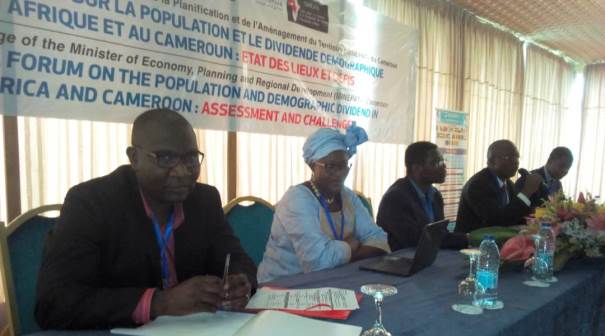National Forum on Population and the Demographic Dividend in Africa and Cameroon:
Assessment and challengesYaoundé, Cameroon, 3-4 April 2018
Organized by the IUSSP Network on Strengthening Demographic Training in Francophone Africa (FraNet) The Network's Steering Committee : • Chair: Parfait Eloundou Enyegue (Cornell University) • Members: Gervais Beninguisse (Institut de Formation et de Recherche Démographiques), Philippe Bocquier (Université Catholique de Louvain), Valérie Delaunay (Institut de Recherche pour le Développement), Jean François Kobiané (Université Ouaga I Pr Joseph Ki-Zerbo), Richard Marcoux (Université de Laval). The National Forum on Population and the Demographic Dividend in Africa and Cameroon: Assessment and Challenges was held from 3 to 4 April 2018 at the Mont Fébé Hotel in Yaoundé, Cameroon. The Forum was organized by the IUSSP Network for Strengthening Demographic Training in Francophone Africa in collaboration with the l’Institut de Formation et de Recherche Démographiques (IFORD) and its Cellule d’Appui à la Recherche et à l’Enseignement des Institutions Francophones d’Afrique (CARE-IFA) and the United Nations Fund for Population (UNFPA) under the patronage of Cameroon's Minister of Economy, Planning and Spatial Planning (MINEPAT). The objective of this forum was to present the results of research on the demographic dividend in Africa in general, and in Cameroon in particular, in order to define strategies to reap the benefits from the dividend. Members of the Francophone African Network (FraNet), representatives of ministerial departments in charge of development planning, representatives of MINEPAT's sub-trust structures (BUCREP, INS and IFORD) and civil society working in population and development sectors took part in this forum. Regarding FraNet’s scientific production on the demographic dividend: - Parfait Eloundou-Enyegue provided background on the debate on the Demographic Dividend and presented the different theories on the Demographic Dividend, the methods used for its measurement and the policies to implement in order to be able to benefit from the dividend. He also announced the forthcoming publication of a book: “50 questions on the demographic dividend.”
- Michel Tenikue presented the two books written by the FraNet network and recently published by the IUSSP: the first is a manual on the contribution of decomposition methods and their application to the study of the demographic dividend and the second is a book on the measurement of the demographic dividend in 47 countries and its potential contribution to African emergence.
- Charles Mouté presented the network’s progress on a fourth book focusing on Education and the Demographic Dividend in Africa, which should also be published in 2018.
- Adrienne Engono presentend the Network of Journalists for Health and Development (REJOSADE) and its involvement in FraNet’s activities. The different workshops on the demographic dividend in which REJOSADE took part allowed its members to be better informed about the concept of the dividend and they have therefore been able to develop communication strategies aimed at popularizing the Demographic Dividend and contribute to its appropriation by the general public.
 Michel Tenikue, Adrienne Engono, Charles Mouté, Gervais Beniguisse and Parfait Eloundou-Enyegue. Following these presentations, participants were grouped into four working groups: health and well-being; education and skills development; employment and entrepreneurship; and rights, governance and youth empowerment. Each group was mandated to identify, in its area of expertise and in view of the studies and works presented, the challenges and actions to be taken so that Cameroon could benefit from the demographic dividend. Each group’s proposals was then presented in a plenary session and followed by exchanges and observations aimed at improving these proposals.  Working session in subgroups. See also: • The meeting report, programme and participant list. • FraNet's web page.
Funding: The IUSSP Network for Strengthening the Demographic Training in Francophone Africa is supported by The William and Flora Hewlett Foundation.
|